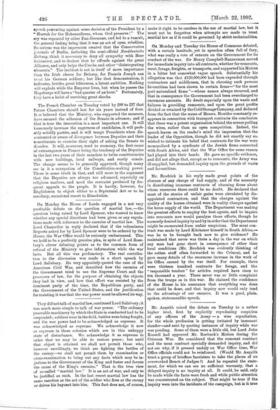On Monday the House of Lords engaged in a not
very profitable debate on the question of martial law, —the question being raised by Lord Spencer, who wanted to know whether any special directions had been given or any regula- tions made with reference to the exercise of martial law. The Lord Chancellor in reply declared that if the voluminous Reports asked for by Lord Spencer were to be ordered by the ,House, the War Office would be seriously embarrassed. This we hold to be a perfectly genuine plea, in spite of Lord Rose- bery's clever debating points as to the common form of refusal of the Ministry to give information while the war lasts. But all this was perfunctory. The real contribu- tion to the discussion was made in a short speech by Lord Salisbury. He very appositely quoted the case of the American Civil War, and described how the enemies of the Government tried to use the Supreme Court and the processes of law, for the purpose of obtaining the objects they had in view, and how that effort was resisted by the dominant party of the time, the Republican party, and the Government of the United States, and the justification for resisting it was that the war power must be allowed its way.










































 Previous page
Previous page